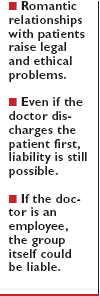Article
Is it ever OK to date a patient?
A young doctor in our family practice group is interested--both socially and sexually--in one of his female patients, and he's asked me for advice about pursuing the relationship. What are the ethical rules about nonprofessional relationships with patients?
Q. A young doctor in our family practice group is interested-both socially and sexually-in one of his female patients, and he's asked me for advice about pursuing the relationship. What are the ethical rules about nonprofessional relationships with patients?
A. Romantic relationships with patients raise many potential legal and ethical problems, as well as possible damage to the group's reputation. Even if this doctor discharges the patient first, or persuades her to switch to another doctor, liability for a post-treatment relationship is still possible.

Most doctors know how difficult it is to mix social and professional relationships. If something goes wrong medically, the doctor may lose both friend and patient. If the relationship goes south, and a problem with the treatment develops, the patient may well become litigious. A patient angry at her rejection might make public accusations that could damage the doctor's reputation-as well as the group's.
Sexual relations between a doctor and a patient may lead to other charges besides malpractice, includng rape, assault and battery, alienation of affection, and negligent infliction of emotional distress. If the doctor is an employee, the group itself could also be subject to liability, particularly if there's evidence that you or your colleagues were aware of the relationship and failed to act.
Malpractice insurance may not cover such claims, since typical policies exclude "intentional acts." In fact, many malpractice policies specifically exclude coverage for claims involving sexual contact.
In addition to legal troubles, this doctor could also face disciplinary action by the state medical board. If the patient filed a complaint, the board could suspend or revoke his license for unprofessional conduct based on state regulations and the AMA's ethical guidelines.
So what action should you take? Have a talk with the doctor and explain the legal and ethical dangers described above. Hopefully, he'll see the wisdom of abstaining from a personal relationship with this patient. If not, the group needs to decide whether the risk you face is worth keeping this physician on as a member.

The author, who can be contacted at lj@bestweb.net
, is a healthcare attorney in Mt. Kisco, NY, specializing in risk management issues. This department answers common professional liability questions. It isn't intended to provide specific legal advice. If you have a question, please submit it to Malpractice Consult, Medical Economics, 5 Paragon Drive, Montvale, NJ 07645-1742. You may also fax your question to 973-847-5390 or e-mail it to memalp@advanstar.com
.





